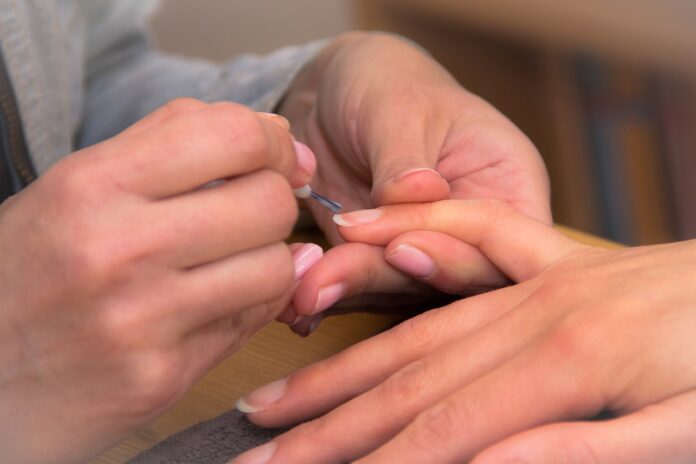
What is a Hangnail?
A hangnail is essentially not a dangling nail – or even a nail.
According to Dr. Ida Orengo, Chair of the Dermatology Department at Baylor College of Medicine in Houston, the term is quite unusual. She confidently asserts that it refers to a small piece of skin located next to the nail.
Dr. Jubek noted that when a piece of skin detaches from the nail, it can feel painful because the skin is typically dry and brittle. He said, the drier your skin is, the more sensitive your cuticles are to splitting and tearing.
Dr. Jubek added, that due to indoor heating in cold weather, the skin can become dry and brittle. Hangnails become more common in dry winter months and dry climates.
Dr. Shehla Adamani, a skin specialist at Stanford Medicine Children’s Health, said that harsh chemicals found in cleaning supplies or nail polish remover can also increase the risk of hangnails.
Dr. Adamani mentioned that people who cut or pick at their cuticles are at risk of hangnails, similar to those with skin conditions like eczema or psoriasis.
While manicures can keep your nails looking good, Dr. Jubek said they can sometimes predispose you to hangnails. He said, “Many times, manicurists will try to push back the cuticles, which can weaken the relationship between the skin and the nail.”
According to disease control and prevention centers, our cuticles help protect against infection, so leaving them alone is best.
Can I get rid of Hangnails?
If you find yourself suffering from hangnails, Dr. Orengo advises soaking the skin around your nails in warm water or a solution of warm water and white vinegar to soften the skin, which can help keep bacteria at bay. Dr. Orengo said the ratio of warm water to vinegar should be about three to one – so if you’re making a cup of solution, mix three-quarters cup of water with one-quarter cup of white vinegar.
Once your skin is softened, you can trim hangnails with sterile cuticle scissors (or nail clippers, as suggested by Dr. Adamani). Make sure your tool is clean by wiping it with rubbing alcohol.
After cutting hangnails, Dr. Jubek recommended applying Aquaphor or Vaseline to the resulting wound. He said this would keep your skin hydrated and protected. Dr. Jubek mentioned that ointments retain moisture better than lotions or creams and are less likely to cause an allergic reaction compared to over-the-counter antibiotic ointments like Neosporin.
If you don’t have any tools to cut your hangnails, Dr. Jubek recommended covering them with ointment and a bandage until they heal – usually within three to five days – to prevent further tearing when using your hands.
He said, “Every time it gets caught on something, it creates more trauma, and the wound becomes bigger than what you started with.”
A clean trim can help, but all specialists have warned against trying to pick or cut your hangnails. Dr. Jubek said, “It can rip your hangnail further than you intended, causing more damage.” He added, using your teeth to cut it could introduce bacteria that cause infection.
Can I prevent Hangnails?
Dr. Adamani said keeping your hands moisturized helps a lot in prevention. She recommended applying cream or lotion throughout the day, especially after washing hands.
She said, “Every time you wash your hands, even with very mild soap, you’re stripping your skin of its natural moisture.” Applying moisturizer again after washing and choosing a mild soap without harsh fragrances can help prevent irritation to your skin.
Dr. Jubek suggested using heavier moisturizing creams before bed, including applying a thick moisturizer or ointment and wearing cotton gloves while sleeping. Dr. Jubek said this would help your hands’ skin absorb the moisturizer.
When to see a doctor?
If you notice redness, swelling, or pus around your hangnails, Dr. Orengo said you may have an infection and should see a doctor to determine if you need antibiotics.
Dr. Adamani said, “Just a dangling piece of skin isn’t necessarily a sign of infection.” But if you’re unsure, a doctor can advise you.
From there, your doctor can determine what kind of infection you have and the best way to treat it, whether with oral or topical antibiotics or with a specialized antiseptic soak.
- Travel Experts Rank the Top Packing Cubes for Seamless Adventures

- New Study Finds Intensive Weekend Workouts Key to Shedding Belly Fat

- What exactly is Dropshipping? A Deep Dive into the E-commerce Phenomenon

- Optimizing Supply Chain Management with Predictive Analytics: A Game-Changer for Businesses

- OpenAI Introduces Groundbreaking Audio Feature: Text-to-Speech Capability Mirrors Human Voices



